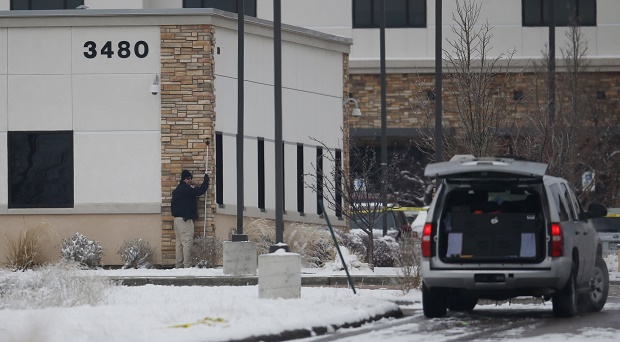
In this Sunday, Nov. 29, 2015, file photograph, a police investigators holds up measure while gathering evidence from the Friday shooting at a Planned Parenthood clinic in northwest Colorado Springs, Colo. In the wake of the deaadly shooting last Friday in Colorado Springs, clinics nationwide are redoubling security efforts. AP FILE PHOTO
DENVER — Bulletproof glass and armed security are nothing new at medical clinics that provide abortions. But in the wake of a deadly shooting last week at a Planned Parenthood clinic in Colorado, clinics nationwide are redoubling security efforts, checking surveillance cameras and reviewing evacuation plans.
Police say they’re adding patrols to clinics to guard against those who might be inspired to mimic a shootout that killed three people and injured nine.
READ: Drifter charged with murder over Colorado shooting
For the folks who work in the nation’s 400 or so clinics that provide abortions, it’s a time of resolve and also reflection about the dangers they face.
“It is an unusual time,” said Vicki Cowart, CEO for Planned Parenthood in the Rocky Mountain Region. “There a vitriol, there’s a hate speech in our country going on right now that could be causing more violence than we might otherwise see.”
But the clinic in Colorado Springs remains closed, heavily damaged during an hours-long standoff last Friday.
The FBI sent a bulletin in September warning such clinics that “it is likely criminal or suspicious incidents will continue to be directed against reproductive health care providers, their staff and facilities.”
There have been 11 murders and more than 220 bombings and arson attacks at abortion facilities in the US since 1977, according to the National Abortion Foundation.
READ: US mass shooting prompts White House recriminations
NAF President Vicki Saporta said her group sent advisories to clinics and hospitals providing abortions to be on heightened alert following the Colorado shooting. The clinics already had extensive security plans, Saporta said. But the gunbattle reminded them to check security cameras, make sure alarms and locks are in working order and to review with staffers a plan for what to do if they believe they’re being attacked.
Planned Parenthood officials have insisted patients and staffers will be kept safe despite any threats. But they have bristled at suggestions that security might need not a renewed emphasis but a complete rethinking.
“This is health care,” Cowart said. “You shouldn’t have to walk through a metal detector to receive health care.”